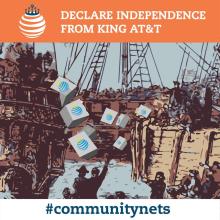Fighting Monopoly Power: How States and Cities Can Beat Back Corporate Control and Build Thriving Communities
The Institute for Local Self-Reliance, of which the Community Broadband Networks initiative is a part, recently released a report, guide, and toolkit all in one. Fighting Monopoly Power: How States and Cities Can Beat Back Corporate Control and Build Thriving Communities brings together the work of all the Institute's initiatives, which advocate for more local control and less consolidation of corporate power.
Here’s the driving impulse:
Concentration has reached extreme levels. Most industries are dominated by a handful of corporations. As we detail in this report, concentrated economic power has reconfigured multiple sectors in ways that have both weakened the broader U.S. economy, by stifling investment and innovation, and harmed working people and communities. This centralization of power in private hands is threatening Americans’ fundamental right to liberty and equality.
Too often policymakers try to alleviate symptoms. This guide calls for dealing with the root problem. Concentration didn’t happen by accident; it’s not the result of inevitable forces. As each section of this guide details, it’s a product of deliberate policy choices. While some of the changes needed are federal, especially antitrust and financial reform, states and cities have potent tools and, as we show, some are using them. During the last Gilded Age, local leaders were the first to take action against monopoly power. This is a guide to the policies that state and local policymakers should enact to rekindle that fight against corporate concentration.
The guide covers lots of ground, offering both analysis and policy solutions for the set of problems plaguing banking, electricity, food and farming, pharmacies, small businesses, state attorneys general, waste, and, of course, broadband.
In fact, broadband constitutes one of the most crucial components of this larger picture. In July 2018 we showed that the impacts of monopoly telecom and cable providers for Americans across the country include high prices, slower speeds, unreliable connections, a refusal to invest in network upgrades, and a dearth of options in rural areas as huge ISPs sought profits in urban markets. Look for an update to this report later this year.




